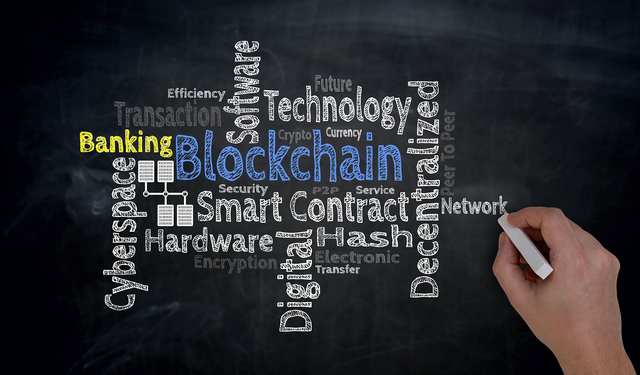Blockchain Applications in Banking
Blockchain Applications in Banking

Many would lead you to believe that blockchain tech and banks are like cats and dogs. The statement is not entirely true, even if there are spheres where these sectors might choose different ways. However, blockchain has proven to have applications that financial sector saw as very interesting, and its solutions have been already applied in some banks as well.
Thus, we made this review about the connection that blockchain shares with banks and what is the future of the potential link.
Blockchain and Banking — a War?
Many crypto enthusiasts thought of blockchain as a complete substitute for banking and middleman in payment systems. Cryptocurrencies, according to many, have the main goal of kicking out banks as intermediaries as it will provide a decentralized peer-to-peer system where fees are low, transfers are fast, and security is top notch.
However, banks did see positive implications in implementing blockchain and many do allow their services to be connected with cryptos. Bank transfers and credit cards are available when purchasing bitcoin and altcoins in many exchanges. Apart from payments, blockchain has several advantages that banks can profit from, much like any other business.
Connecting Banks and Blockchain
Blockchain has functions that improve the efficiency of the financial systems. These have been implemented in various industries with great success, due to their wide-ranged application. In the case of banking, several spheres of blockchain are compatible with financial services, them being a network of information, ledger accounting, and transaction system.

The network that blockchain offers refers to complete communication of vital information among all participants within the system. All transactions and accompanying details find their place within the ledger accounts, available for all parties involved. Each transaction is irreversible, meaning that tempering with data is not possible.
The transaction system offers a platform where all funds can be evaluated according to a single unit of measurement, independent of all factors. Coins that would come out as a result of blockchain technology can be a worthy substitute for several fiats at once.
Smart contracts would help evolve the decision-making hierarchy, securing the network form fraud and misinformation. In the case of banks, the whole network would connect the business with its customers in a system that would provide speed through smart contracts, low fees through unified cryptocurrency, and accuracy through smart contracts.
Current Issues

Although advantageous, there are reasons why many believe in incompatibility between blockchain and banks. The very first reason lies in the fact that its security is not of the level financial institutions can accept. Many hacking and fraud incidents happened in the past, while development efforts, although existent, are yet to answer the changeless of modern cybercrime.
Another reason is the decentralized nature of blockchain technology, while banks keep a strict hierarchy within its doors. The control over the overall market is out of reach for a single entity, while banks work according to the policies set by Central Bank.
Lastly, the fiat currencies fluctuate at a very low frequency and intensity compared to cryptocurrencies. Coins that are active in the market (and many of them are, in point of fact) experiences drastic changes in value, while banks seek stability.
Without a stable market with the more centralized system, it is hard to expect of any major movement of adoption of the technology, apart from individual efforts.
Use Cases of Blockchain in Banks
Several banks did implement their own in-house solutions that include blockchain though it is important to stress the work in-house. Apart from Ripple, rare are blockchain systems that have been accepted by financial companies readily, especially those that are completely decentralized in nature. An interesting fact is that mostly Swiss-based banks are the ones that are actively seeking to research blockchain technology, which is why we chose several of them in our analysis.
UBS — The Swiss-based bank decided to embrace the blockchain technology in 2015, announcing its attention in a white paper. The project was co-financed with IBM, with a name Batavia, where live transactions were conducted with corporate clients. So far, two transactions were made in the meantime, car sales in Germany and textile sales in Austria. Both were cross-border and went through the UBS’s blockchain network.

Credit Suisse — Yet another Swiss bank that explored possibilities with blockchain announced recently its wish to implement the system. Through a partnership with ING, the bank, much like UBS, uses the technology through smart contracts and only for transactions. Yet, its whitepaper stated that in the near future, other features are to be expected, such as complete customer network, and a cryptocurrency within the system.
Santander Group — The bank was part of the project that involved several other financial institutions and Clearmatics (a London-based blockchain development company). The joint venture tested several transactions using the beta version of the platform between participating banks and is said to go live within the second part of 2018.
Future Outlook
It is evident now that most banks are yet to release blockchain-based platforms into the public. They are at the stage of testing and are only observing the behavior of the network within the tightly-controlled environment. It might take some time until a larger portion of financial institutions trusts the network to the point of complete adoption.
Additionally, blockchain network is developed in-house, with very little trust given to already-existent cryptocurrencies. Reasons are simple — most of the coins are based on decentralized marketplace and are prone to large changes. Hacking incidents do not help the cause with banks as well, which pushes the management to develop its own technology.
However, Swiss banks are pushing the agenda, boosted by the government’s favorable stance of the crypto industry. Thus, we can safely say that the future looks bright for the cooperation between blockchain and banks.
Some Final Thoughts
All in all, the banking system has shown interest so far into the blockchain though beta testing is the most we can get of it right now. Thus, patience is needed, especially since most of the institutions choose to create their own systems.
Blockchain has many advantages, ones that banking experts cannot ignore, such as smart contracts, decentralized transactions, and a unified currency. It might take some time until we see the larger application of the tech within the financial sector, but we will get there as seen with case studies in this article.
This is very nice idea on Blockchain Applications. Bank and blockchain war is true and fucher is low.Thank you for this Blockchain Applications.
I Enjoy reading the article, really explains everything about blockchain in detail, the article is very interesting and effective. Thank you and good luck for the upcoming articles.
I love articles that talks about blockchain technology. This article is detailed and very informative especially the part that talks on how to link blockchain to bank.
Excellent method to learn about Blockchain Applications with an complete instructions off currency transactions and financial Sector. while keeping ourself in touch with banking options. Thank you so much
this article provides a clear explanation on the complex relation between blockchain and banking. i had some doubts regarding the same topic and this article solved it.
excellent
Thank you so much for sharing this amazing post with us!
Have you heard about Partiko? It’s a really convenient mobile app for Steem! With Partiko, you can easily see what’s going on in the Steem community, make posts and comments (no beneficiary cut forever!), and always stayed connected with your followers via push notification!
Partiko also rewards you with Partiko Points (3000 Partiko Point bonus when you first use it!), and Partiko Points can be converted into Steem tokens. You can earn Partiko Points easily by making posts and comments using Partiko.
We also noticed that your Steem Power is low. We will be very happy to delegate 15 Steem Power to you once you have made a post using Partiko! With more Steem Power, you can make more posts and comments, and earn more rewards!
If that all sounds interesting, you can:
Thank you so much for reading this message!